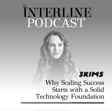Become a Creator today!Start creating today - Share your story with the world!
Start for free
00:00:00
00:00:01

Managing Metaverse Expectations
After undergoing a super-compressed hype cycle, fashion is ending the year with a very complicated mix of optimism and pessimism around the Metaverse. To dissect that, and to look at how digital-for-digital and digital-for-physical workflows and ecosystems interact, Ben talks to Cathy Hackl, Founder and Chief Metaverse Officer for Journey.
This episode of The Interline Podcast is sponsored by Cotton Incorporated. To find out more about how fashion's original fibre is preparing for a digital-native future, and to identify steps you can take today to start designing, developing, and sourcing smartly, digitally, visit www.cottonworks.com
Transcript
Revolutionizing Fashion with Young Talent
00:00:06
Speaker
Maybe the world's next Coco Chanel is an eight year old girl designing clothes and roadblocks. And I wholeheartedly believe that we are going to have a new talent pool in the fashion industry that is going to just take fashion to a completely different level.
Digital Tools in Fashion: An Overview
00:00:21
Speaker
Hi there, this episode is releasing around the time of our first digital product creation report, which paints a detailed picture of digital tools, digital processes and digital assets for fashion as they stand in late 2022. That 210 page report is fully free to read, you don't need to park with an email address or any personal details, and it contains a range of different editorial perspectives on how and why fashion is going digital,
00:00:45
Speaker
And that's along with profiles and executive interviews with 20 key technology players who are defining the future of digital product creation, or DPC, and our own baseline market analysis.
00:00:55
Speaker
It's also a very complimentary read to this show because it comes at a time when many brands are either evaluating or re-evaluating exactly what the future looks like digitally speaking. Digital working is on the rise, right? But dark clouds hang over the opportunity that's presented by actually making and selling digital fashion, which is one of the key pillars of the fashion industry's interest in the idea of the metaverse to begin with. Or, if you put it in another way,
00:01:24
Speaker
physical is here to stay, because the return on investment from using digital processes to optimise the creation of physical goods is just too good for it not to be. But digital for digital, where the final output is a digital asset to be sold or worn, is standing on some shakier ground now that the initial sheen is maybe starting to wear off the metaverse
Cathy Heckel & The Metaverse
00:01:45
Speaker
vision.
00:01:45
Speaker
Now, I've been wanting to spend some time talking to Cathy Heckel for a while now. She's a founder and a chief metaverse officer for Journey, not to mention just being an all-round industry figure, and now feel like the right time. Not just because the Interline happens to be talking about digital product creation at the moment, but because 2022 has been a super compressed hype cycle around the metaverse, and we're now ending the year with a very complicated mix between optimism and pessimism.
00:02:11
Speaker
I'm going to start breaking that all down with Kathy in just a minute, but first I want to introduce the sponsor for this episode, Cotton Incorporated. Now even as the fashion industry looks towards a longer term horizon for creating and selling digital-only fashion than maybe some people had predicted, it's becoming clearer that the benefits of building digital product creation pipelines are going to be felt much sooner.
00:02:32
Speaker
From 3D design and simulation to accurate, producible digital materials, digital pipelines and processes, they're already having a tangible impact on streamlining the production of physical garments. Cotton Incorporated is committed to keeping the cotton industry ahead of this transformation, and to making sure the fashion's original fibre is ready for the industry's future.
00:02:53
Speaker
I recently hosted a live workshop with Cotton Incorporated and the team at Substance by Adobe, where we collectively shone a light on some of the tools, the techniques and the processes that are helping to close the gap between virtual and physical fabrics. That project is showcased in a unique material collection which is available now through cottonworks.com and through the Substance Library. But Cotton Incorporated also has a range of different cotton-rich digital fabrics available through their Fabricast collection.
00:03:19
Speaker
You can download those, you can drop them into your DPC tools of choice, and you can do that safe in the knowledge that the materials you experiment with virtually have the best possible chance of being produced physically. So, as you listen to Kathy and me talk about managing expectations for the future of digital fashion, remember that there are measurable steps that you can take today to start designing, developing, and sourcing smartly, digitally.
00:03:43
Speaker
Find out more about the work Cotton Incorporated is doing to fuel digital product creation by visiting cottonworks.com.
Building Brands in the Metaverse
00:03:49
Speaker
Now, over to my conversation with Cathy. Okay, so Cathy Heckel, welcome. Why don't we start by telling you a little bit about yourself and tell me a bit about what you're working on now as we get towards the end of 2022 and what 2023 looks like from your perspective.
00:04:09
Speaker
Yeah, and thanks, Ben, for having me on the podcast. For those of you that don't know me, my name is Kathy Hackle. I am the chief metaverse officer and founder of Journey, a new design and innovation consultancy. And Journey's built around the thesis of converging physical and digital. So we're fairly new, really, to the market. My consultancy actually got acquired at the end of last year. So this year has been a year for me to kind of help run Journey and build Journey up and
00:04:38
Speaker
That's been exciting. We've been announcing acquisitions. We announced two acquisitions in the last three months So that's been that's been a lot of work and really exciting. We're you know, we're working with a lot of amazing clients from you know
00:04:52
Speaker
brands like Procter & Gamble and Clinique and Nike and Louboutin and working also with Walmart, for example, on all the Roblox work that they've been releasing. So it's been exciting. And so this year for me, Ben, has been a year of building
00:05:11
Speaker
building a new company and acquiring new talent, building my team out. I mean, I went from managing a team of five or so people to now having, in my team, just the Metaverse Studio, a pretty good number, sizable number of folks, maybe 50 to 60 people. I pretty much now run a game studio. That's what I say within my side of journey. Journey is a lot bigger than that.
00:05:37
Speaker
That's been exciting. As I look to next year, I always try to sit down and think about the words that are going to describe the next year in my mind and build. I mean, I'm going to keep building and we're going to get into this, but I always say I'm not trying to define the metaverse. I don't seek to define the metaverse, I seek to build it. I'm in build mode, continue to build, continue to grow the company, continue to grow a journey,
00:06:03
Speaker
help other people, help, um, you know, other women and BIPOC folks enter the space and then transform. I think, you know, if, if anything that, you know, if the metaverse and web three industries have seen any, you know, anything in the last three months, it has been transfer transformation, good and bad. Uh, and I'm sure we're going to get into that, but yeah, I think I'm continuing to build. I think build is the biggest word, um, build and test.
Metaverse Strategies and Challenges
00:06:28
Speaker
Great. Thanks for providing that perspective. And I think my takeaway from all of that is there's a huge volume and variety of people who are very invested in exploring this space. Corporate entities are inclusive profiles for individuals. There's a huge amount of interest and a huge amount of action taking place. So building sounds like a sensible place to be.
00:06:50
Speaker
I always joke and say that I'm in the trenches. So you might see a lot of people out there speaking about Metaverse and Web 3, speaking from theory. Very few of us are actually speaking from experience and implementation. And I don't say I've been in the Metaverse for 10 years, because that's not right, but I've been in Metaverse-related industries for the last decade. So yeah, it's been a lot of building.
00:07:14
Speaker
That's a good coincidence as well because the Interline is very firmly about putting theory into practice. That's where we start. Let's get going then on that basis. I want to start by addressing some of the flames that are spreading across the Web3 space right now as a result of what's happening in cryptocurrencies.
00:07:34
Speaker
So, for at least some of the organizations I've spoken to, the bad that you mentioned has been a bit of a catalyst for people maybe thinking about scaling back metaverse strategies. And I think there's a lot of conflation going on between NFTs, which are anchored in crypto, and Web3 and metaverse, which aren't necessarily so. So, do you think companies are right to let that skepticism spread from the bad to the good?
00:08:01
Speaker
of blockchain and the metaverse if we're going to wrap those things up in the simplest way possible. Are they on divergent paths? This is what I think, you know, and I think companies are taking certain approaches, some of them are scaling back, and it's okay, it's okay to scale back, you know, and I know that's what most people don't want to hear, but I think it's okay, okay, if you need to be cautious, if you're a brand that's not, you know, that hasn't jumped in fully, that is still not convinced, it's okay, right? I feel like
00:08:28
Speaker
Sometimes we do have to slow down to move faster eventually. And there is this moment right now of pause of saying, okay, things were going really fast. Like maybe we all need to, you know, not, and I said this to a friend of mine, maybe we don't need to be like running a marathon, but maybe to power walk and slow down a little bit. So, so I do think that there's this moment right now. So I don't fault any brand for slowing down a little bit. The reality of that is that people, many people like myself who have been here for a while, we're playing the long game.
00:08:58
Speaker
Whether this slows down for a couple of months or even a year or 18 months or whatever, it's okay. We're playing the long game here. We're looking at the longer-term vision. We understand that the metaverse is being built. It's not here yet. It's going to take many years for it to truly be formed.
00:09:14
Speaker
So, you know, a slowdown I don't think is anything bad. It actually could be healthy. And I do think it's healthy in general because there's been so much hype. So much hype around the word metaverse and so much hype around NFTs and Web3. And I almost feel like there's this level of pollution.
00:09:31
Speaker
that needs to be cleaned out in order for us to truly get where we need to be because there's been a lot of hype. So I don't fault any company for doing that. It is smart for some brands to take a step back. Other brands are fully all in and are testing and moving forward to each his own. So I don't necessarily think it's a bad thing. Related to that, I'd like to ask you your perspective on
00:09:54
Speaker
whether you think the vision for the metaverse should or even can be separated from the major players who are the ones who are vying to bring it to life in a way that works for them, if I can put it diplomatically. Because there's very clearly a commercial interest from companies to be the destination or the enabler for the metaverse.
00:10:14
Speaker
But that's all happening at the same time as a much broader kind of groundswell of brand identity, consumer experience, social evolution and so on. Do you do you separate the cultural change from the corporate one or are those two things going hand in hand?
00:10:30
Speaker
I think we need to separate them because I think the culture that is being created inside, for example, gaming spaces, which are a big part of the metaverse, or the culture that's being created in Web 3 around certain Web 3 projects and things like that, those have impact. We're starting to see their impact. We might not see their bigger impact till maybe a year or two years from now.
00:10:52
Speaker
I think that we need to separate them because there are these corporate interests, right? And at the end of the day, these bigger tech jogger nods have shareholders that they need to respond to, right? So, you know, so for example, you hear something like Amazon, the Amazon Alexa division is getting tons of layoffs because, um, you know, Alexa didn't work or, you know, things like that. And you're like, well, does this mean it's the end of conversationally? I, and I'm like, no, it doesn't mean it's the end of conversationally. I,
00:11:19
Speaker
Just means it's evolving and you know, I think it's a huge opportunity for startups right to really capitalize same thing you hear metaverse right and oh Goodness gracious as as someone that is popularly known as the godmother of the metaverse a name I did not give myself but someone from Mikey's team gave it to me Every time I hear that and I hear someone say oh, that's Facebook won't met up, you know now nowadays meta
00:11:43
Speaker
But metaverse is meta or metaverse equals VR. Oh my goodness. It infuriates me in some ways because I'm like, no, VR is just one component and meta is just one company creating this. This is much bigger. It's like saying the internet was created by one person or one company. Well, maybe one person initially.
00:12:03
Speaker
But you know saying that it's all been built only by a single entity, right? We should not want that. So I think we need to separate the culture and the impact of the culture being created in some of these spaces that is centered around community collaboration and co-creation and
00:12:22
Speaker
fandom, as opposed to the corporate entities that, yeah, the reality is we probably will need some of them to create some of the rails. It's not sexy to talk about cloud computing and edge computing, but we're going to need it for the bigger scale of the metaverse. So yes, we are going to need
00:12:40
Speaker
companies like AWS or Google to create those rails.
Opportunities Amidst Tech Layoffs
00:12:45
Speaker
So, you know, I think once again, we need to get away from the hype and understand that there's going to be both the tech jargon of today, build helping build it, but there's also going to be new up and coming players, new companies, new startups. And even right now, Ben, as I think about the fact that a lot of these bigger tech companies are laying off thousands of people,
00:13:07
Speaker
I think about the Web3 and Metaverse startups that now have access to talent that before they wouldn't have access to or would have to create these insane salaries to try to attract, now there's this opportunity. Obviously, for the people getting laid off, it doesn't feel great and it doesn't feel like opportunity, but I've lived through it in the sense that I got laid off from magically
00:13:34
Speaker
Was it in 2020? I left and leaving actually gave me the strength to eventually launch my own company And here's where I am now, right? So so yeah, I think that there is some beauty there I do think we need to separate because the culture being created is different and will continue to impact as opposed to the companies that are trying to build it whether they're startups or big tech juggernauts we have to separate them that being said there they do have the tech juggernauts of today have a lot of power but
00:14:04
Speaker
Yeah, but some of them are not doing great. And that's a conversation maybe for you and me to have around the commerce models of the future, because the ad revenue models of today are definitely not going to work the way they worked in Web 2.0.
00:14:24
Speaker
I think that's a conversation for a separate time, one that I'm very happy to have. I guess the key thing for me there is that the fortunes of the metaverse are not necessarily tied to the fortunes of the companies that are currently dominating the conversation around it. That would be a neat way for me to piggyback on what you're saying. To use your Alexa example,
00:14:48
Speaker
There's an instance of a company that couldn't make that work for them from a profitability perspective or to fit it into their business model in a way that makes sense. Like you said, it doesn't mean the technology goes away. There's not a genie that you put back in the bottle there. And it's now it's an open field that somebody else's job to then take that and to figure out how to make that make sense. Yeah, and it doesn't mean that they've killed the whole thing. It just means, you know, there's a bigger opportunity here. So 100%, 100% aligned with you.
00:15:15
Speaker
If we do put our corporate hats on for a minute, there really seems to be two key questions pertaining to the metaverse for a business, for an organization. The first would be, what does it mean to get started with a metaverse strategy today, given that what we're talking about right now feels like a moving target? And the second would be, how does a brand, specifically a fashion brand, thinking about our audience,
00:15:39
Speaker
How do they go about actually making money from it? Because, you know, the journey we've just described, you know, the hype, the bust, the then realignment, these kinds of things, these are they're not people don't want to make purely speculative investments. They want to make investments that have a return horizon on them. Yeah. So I'll answer your first one. Like, how does someone like, how do brands start with strategy being in things are moving so fast and changing so quickly?
00:16:08
Speaker
That's where I think creating a strategy that has both short-term and long-term in that with the understanding that you have to remain flexible and fluid because things move so fast. That's not easy. That's not easy for anyone in corporate America to do, right? So that's tough, but maybe I'm realistic in saying, okay, I've worked with a lot of companies in creating some of these strategies, but what are we doing for the next 18 months, right?
00:16:35
Speaker
What is pilot A? What is pilot B? Are we going to be doing these concurrently? What are the OKRs that we're trying to test with each one? Is it desirability? Is it feasibility? Starting to think about things like that because even the KPIs are completely different when you're thinking about metaverse and
00:16:53
Speaker
and web three so so yeah creating things that make sense for your brand that are not necessarily one-off marketing activations. That help you the things like I think everything you do when you're going into these waters with your strategy everything you do has to be you have to come away learning something whether it's good or bad and then build off of that.
00:17:16
Speaker
Build on that. Everything has to be organized in a way where it makes sense. It might not make sense to the world outside, but it makes sense to the people leading those initiatives within the company. Getting started with a strategy is, first of all, be smart about what you're doing. If money is an issue now, money is becoming an issue, budgets are being cut. What can you do that has the biggest impact and will give you the best opportunity to learn? Another part.
00:17:46
Speaker
If you're doing strategy and you don't want to be out there being very public about it for x y or z, test in public and private there are ways to work with partners we help brands testing private being able to test and do little things in private that don't necessarily make a big PR announcement that's another one and then.
00:18:04
Speaker
Finding a way, and this is hard being in corporate America, to add flexibility and fluidity into a strategy. You can't add that, but add a way for it to maybe try for your leadership to understand that you need to remain fluid, right?
00:18:17
Speaker
For example, a lot of brands might have been wanting to launch NFTs in December for the holidays. And you see them scaling back and saying, well, let's pull that campaign. We're not going to do that. And that makes total sense. It's not necessarily the right time for most brands to be doing that right now. So yeah, I think you have to have common sense. You have to be smart. And you have to advise yourself by people that actually know the space.
00:18:46
Speaker
I'll tell you something before I get to your second question that I see a lot. I will see creative agencies come to the brands with these grandiose ideas. Beautiful grandiose ideas.
00:18:58
Speaker
and they sell them to the brand and then they're like, oh, they come to someone like us and like, can you build this? And it's like, we can build some of it, but the reality is that whoever pitched this did not understand the limitations of the technology, right? Didn't understand how far can you build on Roblox Studio? How far can you, what can you actually do in Unreal? What can you do in Fortnite Creative, right? So I think that there is that also where you're seeing this enchantment because
00:19:24
Speaker
people buy something then they don't get value, right? Or you cannot fulfill that expectation that they were sold on. So I think that there's some of that happening where there's these giant expectations that it's really hard to meet right now for X, Y, or Z. So I hope that answers question one. And then- It goes. Yeah.
Virtual-Physical Commerce Models
00:19:44
Speaker
And then question two, how do you make money? Okay, at the end of the day, you know,
00:19:50
Speaker
All these companies are trying to think, how do we make money in the metaverse? And this is what I call the path to commerce. What is the path to commerce when you start to converge physical and digital? And it's very nascent. This is so, so nascent. Nothing really has been done at scale. So when I talk about commerce, I take a step back and I say, OK, what are the commerce models we currently have? We have the physical to physical commerce, which we all know how to do perfectly. We all know how to go to a store and come out with a lot of stuff we didn't even need.
00:20:20
Speaker
I don't know how to do that really well. Then you've got, you know, you added digital that they give us e-commerce. E-commerce is still a bit of a boring experience. Pretty flat, right? Even if we had 3D models. Yeah. You know, and AR has definitely helped, you know, but.
00:20:35
Speaker
Then you have virtual-to-virtual commerce, which has been happening in gaming economies for decades. It has been thriving and is worth big amounts of money, bigger than entertainment and some other verticals put together. I buy a sword in League of Legends or I buy a skin in Minecraft.
00:20:56
Speaker
or what have you, right? So that has been going really well. Now what you have when you start to converge physical and digital are two new commerce models that I believe are going to have a massive impact, which are what I call the virtual to physical and physical to virtual commerce models. So I am in an experience, a virtual experience, whether it is the other side from the board at Yacht Club or whether it is Roblox or Fortnite or whatever it is. And I do something or I buy something virtual
00:21:25
Speaker
that eventually arrives in my house in physical form or eventually unlocks a physical perk for me at an event or something right and then the juxtaposition to that is i am at a physical event whether it is coachella or whether it is i'm at a retail store and i buy something where i do something that unlocks
00:21:44
Speaker
something for my virtual persona, whether it is a skin or an acid or a level up or whatever it is. You've got these two that haven't really been done at scale, which everyone's trying to crack. I don't necessarily like the word digital, but it's that convergence. How do you start to converge physical and digital and actually start to create products that go in between both? I think that that's where you're going to see next year, I think a lot more evolution,
00:22:13
Speaker
change a lot more testing. I myself, I'm doing several projects where I'm trying to test these assumptions, try to understand how do you create these commerce models? How do you even start to create these customer journeys? I'm sitting down with clients and trying to figure out what does this customer journey look like from the moment they engage with the brand once to all the way to actually potentially getting a physical item at the house.
00:22:39
Speaker
So yeah, I think that from a making money perspective, how does a fashion brand make money? Right now, the reality is that very few are necessarily making money, or they made a lot of money when Wet 3 was really good last year. I mean, this year, earlier this year and the year before.
00:22:55
Speaker
But it's going to be a process, right? It's going to be a process. Is everyone making money on Web3? Not everyone. Let's be realistic, right? So yeah, I think it's trying to understand what are these new commerce models? What do you as a brand need to have in place to play there?
00:23:11
Speaker
Or is there a startup that is creating a white label service? I hate that word, sorry. That is creating some type of service that you can use, a third-party service that you can use to be able to start to create these physical, the virtual commerce models and vice versa. Everyone's trying to figure out how to make money. Virtual items are definitely a way to do it, but is that the only way? If you're a fashion brand, you still need to move inventory.
00:23:36
Speaker
That's a great point. I mean, I grew up playing video games, still play video games today. So I've always said that, in principle at least, like you mentioned, selling digital items is already a proven model.
00:23:51
Speaker
fashion is already the preeminent industry when it comes to self-expression. There we go. Give yourself a drive to digital self-expression. And it is, in principle, at least a slam dunk for fashion to get into the market for digital assets. That doesn't necessarily mean that it is immediately practical to do it.
00:24:12
Speaker
And I think you're right, and I appreciate the candor when it comes to saying, hey, you know what? It makes sense to do this, but in terms of the steps of how we get there, still being work time.
00:24:23
Speaker
A lot of the fashion houses don't necessarily have the talent. They don't have the Unreal developers and the Unity developers. Some of them do, obviously, because they're building teams, but not everyone has that type of talent. It is going to be a change. What we're seeing right now is fashion and technology have never been closer.
00:24:44
Speaker
than they are today, you know, and I think that's going to continue progressing. I myself, you know, when you, when you asked me about 2023, and I think about the words, one of the words I mentioned to you was help. I'm looking to, you know, I'm looking at, I'm talking to two of the universities where I went, where I got my bachelor's and master's, and I'm talking to one of them about creating
00:25:02
Speaker
a scholarship for virtual fashion design that I'm going to help fund because I truly believe that that is going to be a big part of the future of fashion. Is it only virtual? No, I don't think it's only virtual. I'm still going to wear physical items, but I think that there is a huge path in the virtual side of fashion.
00:25:21
Speaker
And how do we start to create those opportunities? We help others, right? So if I have the chance to create a scholarship and help someone actually have a scholarship for virtual fashion design, then that's my way of helping push the industry forward.
00:25:38
Speaker
That's a great perspective, and that's an encouraging thing to hear for sure. Now, this next one is a bit of a combined personal and professional question, but what does it mean to be a futurist at a time of pessimism?
Futurism and the Metaverse
00:25:50
Speaker
Let me explain what I mean by that. So, you know, it's no secret that for a lot of people, the physical world isn't necessarily a great place to be right now. And you know, with the deepening cost of living crisis,
00:26:01
Speaker
That has serious implications for what it looks like to sell and consume any product, not just fashion, today. So, I mean, do you see the metaverse giving brands a way to maybe sidestep some of the issues of producing and selling physical goods? Is it a new revenue stream at a time when physical inventory is piling up and people don't necessarily have the disposable income to buy physical products?
00:26:23
Speaker
does it open up new social, experiential horizons for consumers whose outlooks are otherwise pretty gloomy? It kind of seems to me that futurism is often twin to optimism. So I'd like to get your take on if and why you're optimistic that the metaverse will improve things from both of those parties.
00:26:42
Speaker
So I remain optimist. I'm not utopian about the future in the sense that I don't think it's all popcorn and unicorns that would be very naive. I'm very protopian. I'm kind of between there's utopia, dystopia, there's protopia in the middle somewhere.
00:26:58
Speaker
I'm more on the Protopian side. Well, I do think technology will help humanity, but we'll bring a lot of challenges. So I do think from a futuristic perspective, the reason that I think futurists are viewed as optimists in some ways, because we tend to look at the longer term.
00:27:15
Speaker
What are the potential futures that lay ahead of us? And if these are the four potential futures that could happen hypothetically, if the preferred future is X, then how do we work towards that preferred future? And I did go to the University of Houston for strategic foresight. So I am professionally trained in strategic foresight. I know a lot of people call themselves futurists. And if they want to, I don't care. Go ahead. But I do think that if you are using that, you should get trained at least in what strategic foresight is in the discipline.
00:27:45
Speaker
because there's a whole world of academia there. But I think that there is a level of optimism just in the sense that we're looking at the longer term
00:27:55
Speaker
We're looking at the second, third-order effects and how everything's interconnected. That being said, I have to take my futurist hat off for a second and have my mom hat. I have three kids. They're all Gen Alpha. I have to remain optimistic because I want to create a better future for them. If I am not building towards that better future, I don't know what I'm doing. I want to leave a better world for my children.
00:28:24
Speaker
Case in point, climate change. Someone was asking me, well, you talk about the metaverse and you talk about Web3, but what about climate change? I actually started changing my talks. Every time I give a talk now, before I even do anything, I say, in order for us to have all these wonderful ideas and concepts of the metaverse and Web3, we need to address climate change as the most pressing issue.
00:28:48
Speaker
Right. So I made that very clear from the, I changed it and I realized like I'm doing a disservice here because in order for us to have all these wonderful things that I'm talking about potentially creating, you know, virtual fashion and all these things, we have to address climate change. I do think that some of the enabling technologies for the metaverse can allow us to educate.
00:29:06
Speaker
more people about what climate change is and how it can impact where they live by helping them visualize what their homes can look like, their cities, their homes, their towns could look like. I think that could be very informative. So I think that there is a way to use technology for good, but also help move the metaverse forward. There's a lot of discussion, obviously, in the fashion industry around
00:29:35
Speaker
virtual fashion, does that solve the fast fashion issue? And the reality is, I always say this, we're still physical beings in the physical world. We're still going to want to wear physical clothes. But if virtual fashion can in some way alleviate some of that, then I'm all for trying to get more virtual fashion if that's going to help because creating a physical garment is going to take a lot more energy and a lot more impact on the physical world than creating a virtual garment.
00:30:05
Speaker
that can be created on a computer and might take several hours on a computer, but potentially a lot less carbon and a lot less impact on the environment because it just lives on a server. That server obviously needs energy to run and all those sorts of things. But I think that there is a conversation to be had there around that. As a futurist, I have to look at the longer term and think about, well, what does this mean the next 10 years, next 25 years?
00:30:32
Speaker
stretching 50, that's a little into 50 years, it's a lot harder for the brain, but really thinking through that and what can we do today? What can we start to do today to potentially lead us into that preferred future? It's not a perfect future, it's a preferred future. I personally think that this is a great time to work with
00:30:55
Speaker
with strategic foresight professionals that know what they're doing. And someone like Amy Webb, for example, I think she's fantastic, Faith Popcorn. Folks like that I think are really, really interesting to work with right now. But yeah, there is a hint of optimism maybe, maybe it's utopian. But as a mom, I have to take my futurist hat off and be optimistic because I do want to leave a better world for my kids. At least that's what I'm going to try to do and I think a lot of us are trying to do.
00:31:23
Speaker
I do think currently with a lot of even mass market fashion, things that are hype-driven drifting out of people's affordability bracket at the moment, when you start to think about selling digital fashion and you start to think about maybe that lowering the barrier of entry for certain things as well, allowing people to
00:31:42
Speaker
different ways into a brand lifestyle that aren't necessarily tied to being able to afford the physical thing. I wonder if there's some empowerment inside things
Accessibility Issues in Metaverse Hardware
00:31:52
Speaker
there. There's an accessibility and inclusivity drive there.
00:31:56
Speaker
Yeah, I'll give you a really good example of something that I think, to me, was eye-opening. I was asked to be the chairperson for Metaverse Fashion Week earlier this year, and I gladly accepted. And I had to decide what am I going to wear in the physical world, right? That was easier for me. And what is my avatar going to wear? And eventually, I got presented with a design by a designer that is legally blind.
00:32:26
Speaker
and I wore her dress, it was a wedding dress, I'm not getting married. But it was, I wore it because to me it made a statement of, this is truly amazing that someone that is legally blind can be a virtual fashion designer using tools like voice and different elements. And to me that was powerful because it really opened my mind to think about, wow, what are the opportunities that virtual design opens up?
00:32:54
Speaker
Right. So I thought that was one of those moments was like, there is a path towards accessibility. There is a path to potentially more opportunities. And I just read a statistic. I don't remember the exact numbers that said that because we've been working so much from home, a lot of people with disabilities are working more because they're actually able to stay at home and work from home. I think that that is powerful. There is some element there of empowering and allowing accessibility.
00:33:24
Speaker
That being said, I also get asked, in a metaverse world where the way you consume information is through glasses, not headsets, not VR headsets, but AR glasses, augmented reality glasses, that look like gray bands that could be very expensive, does that create a have and have nots, right?
00:33:42
Speaker
And the reality is that potentially, yes, because only certain people are going to be able to buy this really expensive hardware or access the networks and the rails that we talked about that allow us to consume all this digital content in front of us, or they might be bombarded with ads. So that is, in itself, another consideration, is there's amazing opportunities that can equalize and democratize, but then, to be realistic, there potentially will be a very even further divide that technology can create.
00:34:12
Speaker
I mean, to your other point, if there's ever a dystopian vision, the idea of there being a digital layer on top of reality that only the rich can access is one of them. I mean, tied to that kind of a shorter question this time across, how do you see new hardware being adopted into people's personal and work lives as it evolves? Because you mentioned AR glasses, they talked about HMDs, but
00:34:37
Speaker
The Metaverse includes flat screen experiences, includes AR, includes VR. And I think some people are looking at the hardware as it's being sold right now as an entry point to the Metaverse. They're looking at that as more of a barrier than they are as an enabler. So how do you see technology working its way into broader adoption?
00:34:57
Speaker
I've been in hardware, I mean, I've been in the hardware space for a while. I started off, well, I started in cinematic virtual reality, but my first big job was HTC Vive, which, you know, it creates VR headsets. And then went over to Magic Leap, once again, hardware with some software. So hardware is very hard and hardware, you know,
00:35:17
Speaker
In order for us to truly, this is what I tell people, I think we're underestimating how hard it is to put a supercomputer on someone's face. This is a very hard challenge from the battery power to the field of view to the optics. There's so many levels here that the hardware is just going to keep evolving. Eventually, some of the things are just going to become paperweights. I have old VR headsets and literally are paperweights.
00:35:45
Speaker
So the hardware does hold this back. I think where the investment has to be is yes, we still need the hardware to be great, et cetera, but the investments will have to be also in the content because if there's no reason for me to put this headset on or this hardware or to access this experience through my phone or my computer, then why would I even go there? So if the experiences that are compelling, that could be culturally relevant are not there, then why would I even start going down that path?
00:36:13
Speaker
So, so I think there is something to say there. And I think we, we as humans, we tend to be obsessed with hardware. Uh, I mean, every, you know, box, you know, box opening and, uh, you know, every like take, you know, let's take down this, you know, this piece of hardware and open it up, et cetera. Um, so I think that there's a, there's a lot of obsession there because we're, we're very physical tactile beings, but where I'm interested in is more on the content and how to create compelling content.
00:36:38
Speaker
content that is culturally relevant, that is valuable. I guess sometimes the hardware does get in the way, but if you think about it, many of us are already using AirPods every day and that kind of augments our audio and our reality in some ways, and we all live on our phones.
00:36:57
Speaker
So it will be an interesting transition. I think hardware is very hard. It takes a long time. And even when we think about moving and I talk about this, you know, that we're going to potentially move away from our computers and our phones and the flat screens and the rectangles and our walls and our desks and our hands. But it's going to take a long time.
00:37:18
Speaker
right, to move into glasses and not every, and the first glasses would, you know, let's say hypothetically, whatever Apple does bring to market eventually, it's not going to be perfect. Just like the first iPhone was not perfect. They didn't, it didn't even have an app store, right? So the first wearables are going to be clunky. They're not going to be great. They're going to eventually live in a, you know, museum. So the hard work can sometimes hold us back. I think where people need to focus and start to really think through is like the content, the experiences, right? It's,
00:37:48
Speaker
It's the experienced layer of that future reality that excites me. That's a great answer. And second to last question. So provided you're not a service company, right?
Integrating Digital and Physical Strategies
00:38:00
Speaker
Provided you're actually making physical goods, it feels like we're a bit of a fork in the road now where there's an opportunity to also start selling digital goods or at the very least using digital assets as the start of a consumer journey that ends with a physical purchase.
00:38:13
Speaker
That's especially relevant because of the digital product creation report we have coming out around the same time as this podcast. We have people who are working on creating digital assets and suddenly they have a horizon that opens up to potentially monetize those assets they've been using for themselves. So do you think fashion brands should be looking at having separate physical and digital business units?
00:38:33
Speaker
Or do you see those two things as being part of the same whole? I'm going to sidestep the word vegetal because we've already said we don't like that one. But thinking, for example, about a company like Walmart, how would they compartmentalize their ROBLOX partnership? Is it customer acquisition? Is it digital marketing? Is it customer service? What profit and loss sheet does it all live on? Or are the really forward thinking companies just doing away with that distinction completely?
00:38:58
Speaker
Yeah, and I can't speak to the Walmart example specifically because they are a client, but what I will say is the following. The first thing you need to do as a brand, right? If you're thinking of creating anything, like if you're thinking of creating a Metaverse business unit or having someone head up Metaverse, the first thing you have to do is look internally.
00:39:21
Speaker
Talk to your HR teams, figure out who within your organization is all passionate about this. Who might already be doing it? Who has the skills? Because what I'm finding is a lot of these amazing people within these companies that have these skills but are kind of not being valued by those organizations.
00:39:44
Speaker
So they eventually leave. They're like, I'm done with this. They don't recognize how smart I am and how much I know about X and they leave. So look internally at who within your org might be a Unity developer, an Unreal developer, might know the Solidity, might be very knowledgeable about this, might have an NFT project on the side.
00:40:02
Speaker
Start to look at those people within your org right because those people are really the ones that are going to help your company move faster because they already know your brand your brand culture etc that's one thing and i think people forget about that. You know if you have the money to look externally definitely look externally do you need a whole business unit it depends on what brand you are.
00:40:24
Speaker
If you're Balenciaga or Gucci, of course it makes sense for you to have a business unit. If you're a different brand, maybe not a business unit, but maybe someone leading the charge. I like, for example, with Crate & Barrel, you've got Sebastian Brouwer, amazing, amazing mind and design. Just from a human angle, he's just an amazing person. He heads up the Web 3 and Metaverse for Crate & Barrel, but he still has other design functions for the physical products.
00:40:52
Speaker
Things like that. How can you start to create these types of roles within your organization? Or if you're going to go fully and create a business unit, what talent do you already have? Another important thing, Ben, that I think for any brand is if you're going to start to go down the path of virtual fashion,
00:41:10
Speaker
communicate internally to your employees. Because what you don't want to see, and I've seen this happen before, is that you launch a virtual asset, a virtual X, right? And then people in turn are like, what does this mean for me that I'm manufacturing these
00:41:25
Speaker
this product, this physical product, doesn't mean we're only going to be virtual from the future, moving from here. So internal communications also is an important part of letting your employees know. We're experimenting in virtual, but it doesn't mean that we're going to continue to have a physical product. So I think things like that are things that a lot of these brands are not thinking through. They're just thinking of, maybe thinking of the chief metaverse officer and I am one, but how do we hire one of those?
00:41:54
Speaker
look internally first start there if you have the chance look sternly try to find the right person try to work with third parties communicate with your employees internally as well so they know this is what's going on it doesn't mean that physical is over for us like lots of these sorts of things that i think a lot of people.
00:42:12
Speaker
are not thinking through and are not really paying attention to. That would be my advice for anyone there. Do you separate them? I think that's going to depend on how the brand operates. There are certain brands that move a lot faster. There are certain brands that move a lot slower, especially in the luxury space.
00:42:31
Speaker
You know, some of them have license to, you know, to do lots of amazing things. Others don't. That is really going to come down to almost like a bespoke, metaverse approach, brand by brand, especially in the luxury space.
00:42:44
Speaker
Okay, perfect. And I like what you said there around making sure that people understand internally that doing things digitally, at least targeting a digital output doesn't necessarily mean sacrifices being made on the physical side of things. And that's actually my final question. I'd like to see if you have a perspective on whether the kind of
00:43:03
Speaker
the digital workflows and assets that are going to deliver on the vision for the metaverse eventually, could also have value outside it. Because we've talked so far mostly about digital. We've talked a lot about digital for digital, right? But as our Digital Procreation Report, which is coming out around this time, talks about, there are big benefits to making decisions and building processes around digital twins of physical goods that then only become instantiated at the last possible instance.
00:43:30
Speaker
you have a digital workflow, an old digital workflow that then eventually turns into a physical product. So do you think there's a tangible real world benefit to putting the foundations in place to get Metaverse ready and thinking about return on that? Because the return manifests itself indirectly in kind of streamlining and optimizing the way that you work in digital for physical.
00:43:53
Speaker
definitely a tangible opportunity and result in the sense that you've heard me talk about the Metaverse during this whole interview. When I'm talking about the Metaverse, I'm talking about, yes, part of it is virtual, virtual spaces, virtual worlds, but it includes the physical world as well. That part just hasn't been fully enabled. When we think about creating these virtual or digital workflows, these virtual products,
00:44:19
Speaker
Eventually that's gonna bleed into the physical world and i think for me the biggest opportunity the holy grail of the metaverse is when you truly combine virtual and physical. Right i got a question the other day and someone said who's the metaverse for.
00:44:32
Speaker
I said, well, if you take a step back and you look at how I look at the metaverse, both from virtual worlds, but also the physical world, then the metaverse is for everyone. Because when you eventually finally enable the physical world, it will be for everyone. Access was another question that we obviously brought up, but it is eventually for everyone. It's not only for Gen Z or Gen Alpha. Right now, Gen Z and Gen Alpha over index because they're on the virtual world side, but eventually it's going to be for everyone. Any investment that a brand or a company does,
00:45:02
Speaker
today to create those digital workflows, those digital twins, those virtual assets is only going to benefit them in the long term once that, you know, once virtual and physical are truly converged.
00:45:13
Speaker
So yeah, definitely don't think that this is only a virtual push This is about combining virtual and physical and whatever you can do today to build is important I use a phrase always been many people hear me say this said in the in the metaverse We are all world builders and now is your time to build that applies for those digital workflows Workflows for virtual fashion for everything that's happening.
The Next Generation in Fashion: A New Era
00:45:36
Speaker
You know, I also always say that maybe the world's next Coco Chanel is
00:45:40
Speaker
is an eight-year-old girl designing clothes and roadblocks. And I wholeheartedly believe that we are going to have a new talent pool in the fashion industry that is going to just take fashion to a completely different level.
00:45:52
Speaker
I'd like to thank today's sponsor Cotton Incorporated again for supporting the show. The work they're putting in to keep fashion's original fibre ahead of the curve in digital product creation is a strong example of how fashion already has some of the right tools at its disposal to start thinking about not just a digital future, but a present that brings together digital and physical to unlock smart sourcing strategies. You can find out more by visiting cottonworks.com.
00:46:17
Speaker
And it's goodbye for now from me too. If you've got value out of my conversation with Kathy, I'd encourage you to follow her on LinkedIn, and me as well if you feel like it, to keep a finger on the pulse of what's happening in 3D and DPC for fashion, as well as developments in the broader metaverse space. Despite mining Kathy's different job titles, we're both pragmatists and realists when it comes to the potential of technology. And there's going to be a lot more to say from that standpoint over the next few years.
00:46:43
Speaker
I'd also like to end with another reminder to check out our digital product creation report. It's free to download direct from the Interline right now. No need to put in your email address or part with any personal details. And it's more than 210 pages of analysis, editorial, interviews, and technology profiles, all dedicated to exploring how fashion is progressing along the roadmap to digital native working.
00:47:05
Speaker
Our next episode and the last one for the year is going to be a look back at how digital transformation has developed in fashion throughout 2022, as well as a look forward to what 2023 has in store. So whatever your holiday you celebrate, I hope you'll join me and my guests later in December for a special festive show. Thanks for listening.


















